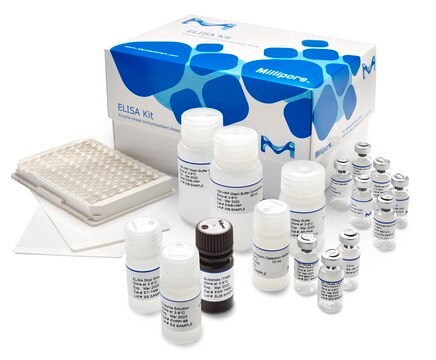RAB0326
C-Peptide EIA Kit
for serum, plasma, culture supernatant and cell lysates
Synonym(s):
C-Peptide
About This Item
Recommended Products
species reactivity
human, mouse, rat
packaging
kit of 96 wells (12 strips x 8 wells)
technique(s)
ELISA: suitable
enzyme immunoassay: suitable
input
sample type plasma
sample type cell lysate
sample type culture supernatant(s)
sample type serum
assay range
inter-assay cv: <15%
intra-assay cv: <10%
sensitivity: 772 pg/mL
standard curve range: 0.1-1000 ng/mL
detection method
colorimetric
shipped in
wet ice
storage temp.
−20°C
Gene Information
human ... INS(3630)
General description
Immunogen
Application
Please refer to the attached General ELISA KIT Procedure (sandwich, competitive & Indirect ELISA)
Biochem/physiol Actions
Signal Word
Warning
Hazard Statements
Precautionary Statements
Hazard Classifications
Met. Corr. 1
Storage Class Code
8A - Combustible corrosive hazardous materials
Choose from one of the most recent versions:
Certificates of Analysis (COA)
Sorry, we don't have COAs for this product available online at this time.
If you need assistance, please contact Customer Support.
Already Own This Product?
Find documentation for the products that you have recently purchased in the Document Library.
Our team of scientists has experience in all areas of research including Life Science, Material Science, Chemical Synthesis, Chromatography, Analytical and many others.
Contact Technical Service








